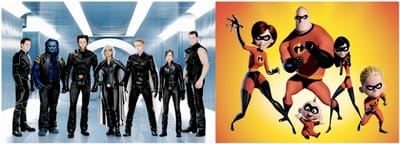Asynchronous development describes how gifted kids grow unevenly: advanced in some areas and startlingly young in others.
Schools expect tidy, predictable development. Gifted kids rarely cooperate. You might see a child who writes at a middle-school level but melts down over a missing pencil.
Example:
A student solves multi-step math problems but bursts into tears when a partner changes the plan.
Why it matters:
Asynchronous development isn’t misbehavior or immaturity. It’s normal for gifted learners — and it dramatically changes how we support them.
“But all kids develop at different rates!” one might cry.
Yep. But since gifted students’ intelligence develops so quickly, the difference in these rates is more pronounced than in the general population.
Super Heroes
I think of superheroes as great examples of asynchronous development.
The X-Men, Spiderman, and the children of The Incredibles all have super-human physical abilities. Yet rarely does a superhero develop equally super-human emotional or social skills to accompany their physical gifts.

As a result, we see teenagers who can levitate objects, create fire with a thought, or race faster than light, yet they struggle with the typical issues of everyday teens. Worse, their incredible strengths highlight their areas of weakness, making their insecurities especially frustrating and (in some cases) even dangerous.
Because of their extreme asynchronous development, they need especially wise mentors to guide them through their youth.
Wide Discrepancies
The “wide discrepancies” experienced by gifted learners might lead to a highly intelligent child, thinking far beyond her grade-level expectations, but perhaps her gross motor skills are under-developed. Or even her fine-motor skills.
Can you imagine the frustration of being incredibly intelligent, yet always being called out for your poor handwriting? Dr. James Webb comments on this topic:
These children may see in their “mind’s eye” what they want to do, construct, or draw; however, motor skills do not allow them to achieve the goal. Intense frustration and emotional outbursts may result. James Webb, Ph.D.
Emotional Considerations
The potential frustrations for a gifted child increase when you consider the potential emotional minefield that a high level of moral awareness at a young age brings.
Imagine being sharply aware of the ethical ambiguities present in the world at age six. Now imagine trying to deal with that with only a six-year-old’s emotional abilities. Consider what it’s like to feel the emotional devastation of a natural disaster, but without the experience to handle those feelings.
[The gifted] are emotionally intense and have a greater awareness of the perils of the world. They may not have the emotional resources to match their cognitive awareness. Linda Silverman, Ph.D.
Our Job
As teachers and parents of these children, we have to be aware of these issues facing our gifted learners. Not only are they dealing with the usual trials of growing up, but they are also often doing it with an increased awareness of their faults, a frustration with being unable to do everything well, and a world that often doesn’t know what to do with them. Worse, they often lack the emotional tools to accompany their increased awareness.
We have to be their wise mentors. We have to make sure to teach them, even if it’s not an academic lesson.

